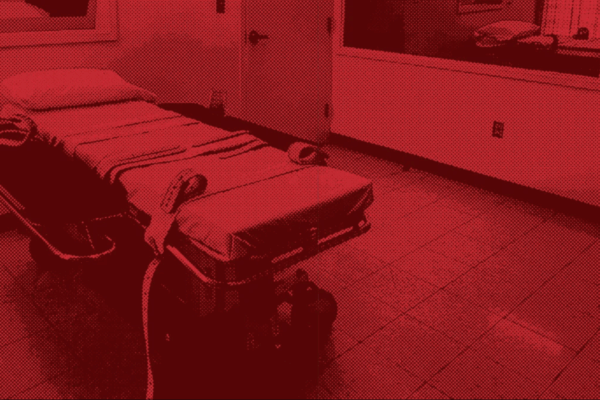On the day after Valentine’s Day, Kansas Attorney General Kris Kobach went to the Capitol and made a surprising announcement to the media: Nearly 60 years after the state carried out its last execution – and almost exactly 30 years after its current death penalty law went into effect – Kansas might soon be ready to once again put a convicted murderer to death.
“It’s possible,” he told reporters, “that one of the cases could be ready as early as nine months from now.”
There were several families on hand for Kobach’s news conference, relatives of people murdered by the nine men who now sit in Kansas prisons awaiting execution. (Two others convicted of capital murder, Kobach said, had died in prison while their appeals were ongoing. They “escaped justice,” he said.) All of the families have been waiting for years. Some of them for decades.
They are ready for the wait to end.
“My issue is this all happened to us 17 years ago to my daughter,” said Brian Sanderholm, whose daughter, Jodi Sanderholm, was killed in 2007. Justin Thurber, the man convicted of capital murder in her death, received his death sentence in 2009.
Brian Sanderholm and Jennifer Aldridge, the father and sister of Jodi Sanderholm, who was murdered in 2007, told reporters at a news conference in February at the Kansas Capitol that solace will never be theirs until Justin Thurber, the killer sentenced to die in 2009, is put to death.
“It’s just cruel and unusual punishment, the way I see what we’re going through, because it’s been 17 years,” Sanderholm said that day. “Every day when I go uptown to dinner, to eat or anything, to see anybody in the public – and I am in the public’s eye quite a bit – somebody’s talking about it. Somebody brings it up. Something happens that Jodi’s name and her issue comes up again.
“We have to live through it every day,” he told the assembled reporters. “There is no closure for us, and we need your help getting us closure. So please help us.”
Whether that closure is coming soon, though, is an open question. After Kobach’s news conference, Mark Manna – who leads the Kansas Death Penalty Defense Unit – sounded skeptical that a Kansas execution might come within the year.
“I think that’s highly unlikely,” Manna said, ticking off the appellate status of several cases. But, he acknowledged, some of those cases were entering their final stages. “So it’s possible in the next handful of years there could be a client ready for execution.”
It’s not unusual that Kansas has taken so long to conduct an execution under the law passed in 1994. Capital cases nationwide often take at least a decade or more to resolve, according to the Death Penalty Information Center, a nonpartisan outlet critical of how the penalty is applied.“More than half of all prisoners currently sentenced to death in the U.S. have been on death row for more than 18 years,” the center says on its website.
The process can take a toll on participants. Prosecutors say they warn the families of victims that capital cases take a very long time to resolve.
“For a case that starts this year, I don’t know what to tell you family members about how long this process will work,” said Sedgwick County District Attorney Marc Bennett at the press conference, “but I’m probably buying your grandchildren the misery of seeing this through.”
The history
As a state, Kansas has always had an ambivalent relationship with capital punishment. It had a death penalty law on the books from 1861 to 1907, but governors mostly refused to sign off on executions during that time. (There were several executions under military and federal law during that era, however.)
“Personally I have always been opposed to capital punishment,” Gov. Edward Hoch wrote in 1906, “and as a student of the subject have long since become convinced that it is not a deterrent of crime, but a promoter of it.”
The death penalty law was repealed the next year, then restored decades later, in 1935. But the law was used infrequently. Fifteen men were executed between 1944 and 1965. The last two — James Douglas Latham and George Ronald York – were Army deserters who in 1961 killed seven people in five states, including 62-year-old Otto Ziegler of Oakley. (Perry Smith and Richard Hickock, the infamous “In Cold Blood” killers, had been executed two months earlier.)
“There is nothing to say but that I am going home to heaven,” York said, moments before he was hanged at Lansing.
Seven years elapsed between that execution and the Supreme Court’s 1972 decision declaring the death penalty unconstitutional in all 50 states. The court restored the penalty – under limited circumstances – in 1976. But it took nearly two decades after that for Kansas to pass its new death penalty law.
It wasn’t for lack of trying. Gov. John Carlin vetoed bills in 1979, 1980, 1981 and 1985. “We must find other means of deterring murderers, punishing them and seeking retribution from them,” he wrote in 1985. “I am confident we can do that.”
There were more failed attempts during Gov. Mike Hayden’s term in the late 1980s, despite his advocacy for a bill. The process that resulted in the enactment of the 1994 law was yet another reflection of political ambivalence: Gov. Joan Finney let it go into effect without her signature.
“I am personally opposed to the death penalty,” she wrote to the Legislature on April 22, 1994, “but believe that a majority of Kansans support it as a matter of public policy.”
And then the wait began.

